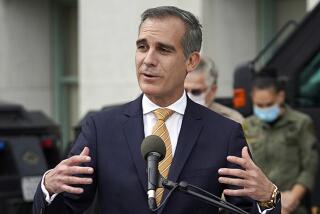Angry Shultz Asks Beirut Envoy About Secret Deals
WASHINGTON â Secretary of State George P. Shultz, still angry at having been kept in the dark, questioned the U.S. ambassador to Lebanon on Saturday about the diplomatâs secret Iran-and-hostages dealings with a former White House aide and an international arms merchant.
In a clear indication of the significance he attached to his confrontation with Ambassador John H. Kelly, Shultz went to his office on his 66th birthday, less than 12 hours after returning from a weeklong trip to Europe, to find out why the envoy bypassed the State Department in his conversations with Marine Lt. Col. Oliver L. North and retired Air Force Maj. Gen. Richard V. Secord.
State Department spokesman Charles Redman said he could not provide any information about the secretaryâs meeting with the ambassador, but Shultz, in earlier comments, emphasized that Kelly had a great deal of explaining to do.
In testimony Monday before the House Foreign Affairs Committee, Shultz said he had discovered that Kelly used secret âback-channelâ contacts with North, then a National Security Council aide, and Secord, a weapons broker, to discuss the use of arms sales to Iran as an âinducementâ to win the freedom of U.S. hostages in Lebanon. Shultz said he was âshockedâ that a career diplomat would keep such contacts secret from his State Department superiors.
Shultz said the chain of command âgoes from the President to me--not the NSC--to me . . . to the ambassador. . . . If something comes up that causes an ambassador to go outside of this chain of command, there needs to be a good reason.â
Kelly was sent to Beirut last August, succeeding Reginald Bartholomew. Although Bartholomewâs tenure covered more of the secret 18-month-long U.S. overture to Iran than Kellyâs, Shultz said that Bartholomew had not committed any similar breaches of State Department procedures.
âWe are always kept very well posted by Ambassador Bartholomew in any of his posts,â Shultz told reporters aboard his aircraft on the flight back from the North Atlantic Treaty Organization meetings in Brussels. Shultz arrived in Washington early Saturday.
Shultz said that Undersecretary of State Michael Armacost questioned Kelly earlier. The ambassador was called home from Beirut on Monday. Sources said Kelly told Armacost that he had been assured by then National Security Council adviser Vice Adm. John M. Poindexter that Shultz was aware of the operation.
President Reagan did not even mention the Iran crisis in his weekly radio speech, concentrating instead on tax and budget policies. The address seemed to be the first example of the new White House strategy of trying to deflect attention from the affair by emphasizing that the Administration was going about the business of governing.
Meanwhile, Senate Majority Leader Bob Dole (R-Kan.) on Saturday urged Reagan to invite the leaders of all major U.S. allies to Washington for an extraordinary summit meeting to explain the Iran situation and to âgive them meaningful assurances that there will be no more arms to Iran; no more secret missions to Tehran.â
Dole said it was âjust plain stupidâ to divert some of the profits from the arms sales to aid anti-government contras in Nicaragua.
In a speech at commencement ceremonies at the University of New Hampshire, Dole said: âThe Presidentâs credibility is being challenged; his ability to provide leadership questioned. We canât stand by and let this affair, bit by bit, sap the Presidentâs authority.â The text of the speech was made public by Doleâs office in Washington.
Dole said it was vital to get out all of the facts about the entire controversy. He said Reagan was doing his part but he was critical of Poindexter, North and Northâs deputy, Lt. Col. Robert Earl, who have invoked constitutional privilege to avoid testifying before congressional committees.
âNone of us has the right to demand that they give up the legal protections they enjoy as Americans,â Dole said. âBut we do have the right to express the view that the country must come first--that it is vital to help the President restore the credibility of his Administration.â
Rep. David E. Bonior (D-Mich.), in the Democratsâ weekly radio speech, attacked the diversion of funds to the contras as âa cancer on this presidency,â using the same phrase that former White House counsel John W. Dean III used more than a decade ago to describe the Watergate scandal that ultimately destroyed the Administration of President Richard M. Nixon.
âWatergate was horrible, but . . . this scandal has deeper and wider ramifications, for it touches the power to declare war--the most awesome decision any leader or nation can make,â said Bonior.
More to Read
Sign up for Essential California
The most important California stories and recommendations in your inbox every morning.
You may occasionally receive promotional content from the Los Angeles Times.










